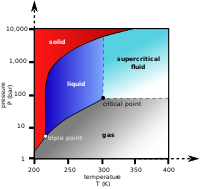
Photo from wikipedia
Abstract Supercritical organic Rankine cycle (SORC) is considered one of the most promising candidates for producing electricity from medium- to low-temperature heat resources. Various types of alloys are considered potential… Click to show full abstract
Abstract Supercritical organic Rankine cycle (SORC) is considered one of the most promising candidates for producing electricity from medium- to low-temperature heat resources. Various types of alloys are considered potential materials for constructing the main SORC components. The decomposition of a working fluid, R-1234ze(E) (trans-1,3,3,3-tetrafluoropropane), in the high-temperature region of the SORC loop produces hydrogen fluoride (HF), which affects the stability of the alloys. In this work, the corrosion behavior of seven selected materials under supercritical R-1234ze(E) conditions was examined. In the turbine inlet region of the designed SORC loop (180 °C, 5 MPa), the formation of a thick scale layer (10–40 nm) and penetration of F in the subsurface region were observed in the SS304 and SS316 samples after seven days of exposure. In the case of copper and bronze, the erosion of the surface and hole formation at the bulk phase were caused by the deep penetration of HF. In contrast, SS630 and Inconel 718 exhibited excellent corrosion stability without changing the chemical environment of their subsurface regions. In the case of Al6061, preferential segregation of the MgF2 layer in the subsurface region was observed.
Journal Title: Journal of Industrial and Engineering Chemistry
Year Published: 2021
Link to full text (if available)
Share on Social Media: Sign Up to like & get
recommendations!